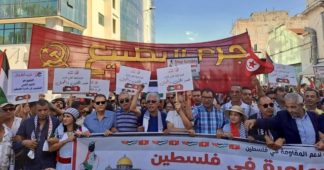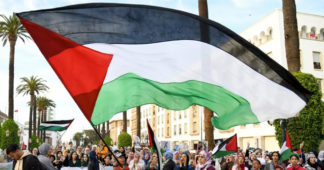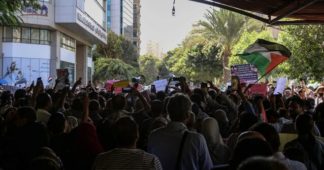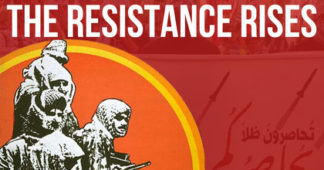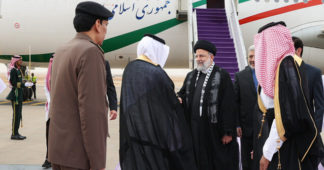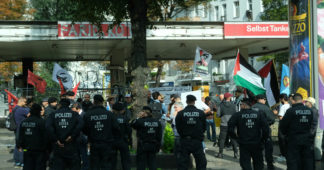By Yara Hawari
Mar 6, 2024
Since the Israeli regime unleashed an unprecedented attack on the people of Gaza, amounting to what many experts have identified as ‘genocide’, millions from London to Jakarta have taken to the streets in solidarity with the people of Palestine.
Much of the Arab world has reacted with outrage too, with demonstrations taking place in Jordan, Bahrain, Tunisia, Yemen, Lebanon and even a small protest in Dubai where such actions are effectively banned. A recent survey of Arabs across 16 countries reveals that 88 per cent stand in solidarity with the Palestinian people and 84 per cent have expressed great psychological stress as a result of the war.
This outpouring of support is hardly surprising; Arabs have long felt a deep affiliation with the Palestinian struggle for liberation.
Reflecting on generations of Palestinian resistance, and its influence on the 2011 revolution in his own country, Egyptian political prisoner Alaa Abd el-Fattah wrote in 2021: ‘My generation was raised on scenes from the Second Intifada [2000-05] and launched itself onto the scene with student demonstrations in support of Palestine.* One movement followed another until this generation led a revolution. Yes, the roots of the revolution lie in the solidarity demonstrations with the Second Intifada, for we are Arabs and Palestine is always on our mind.’
Despite this strength of feeling, there has been a stark disconnect between the popular Arab support for Palestinian liberation and the action or inaction of Arab regimes. It has not gone unnoticed by Palestinians who have long expressed their rage at what is called khiyanah – betrayal or treachery in Arabic – of their struggle.
Blurred lines
In the decade after the 1948 ethnic cleansing of Palestine, and the creation of Israel, Arab leaders engaged in secret negotiations with the Israeli regime. Most prominent among them was Morocco, which clandestinely fostered relations with the security services, Mossad, under King Hassan II in the 1960s.
Such co-operation peaked at the 1965 Arab League Summit in Casablanca, where Mossad was reportedly involved in helping the Moroccan secret services bug the hotel rooms and conference halls of Arab leaders in attendance.
King Hassan II would later host secret meetings between Mossad and Egyptian officials, which eventually led to the first official normalization deal between an Arab state – Egypt – and the Israelis, establishing diplomatic relations between the two countries. Egypt signed a treaty with Israel in 1979 and in return Israel withdrew from the Sinai Peninsula, which it had occupied since 1967.
Later, in 1993, the Palestine Liberation Organization (PLO) and the Israeli regime signed the Oslo Accords. Under the agreements, the Israelis accepted the PLO as the representative of the Palestinians and in return the PLO recognized Israel’s right to exist. This opened the door for further regional normalization. As writer and political analyst Omar H Rahman has written, ‘the red line prohibiting a liaison with Israel among the Arab states was blurred. After Oslo, ties developed, informally and clandestinely, largely kept under wraps because of the persistent taboo among Arab publics toward normalizing relations with Israel while the Palestinian people remain under Israeli occupation.’ On a street level, this normalization – or ‘tatbee’ in Arabic – was deeply resented.
It wasn’t long before Jordan did the same in the 1994 Wadi Araba Treaty. The agreement officially ended the state of war between the two nations, establishing full diplomatic relations and the position of border crossings between them. In return, Jordan received substantial military and economic aid from the West and cemented its position as a key US ally in the region.
Then, in 1996, Qatar became the first Gulf state to de facto recognize the Israeli regime by establishing trade relations. At the 1997 Middle East and North Africa Economic Summit in Doha, the Qataris hosted the Israeli trade minister – a move that outraged the Saudi Arabian regime at the time. The relationship subsequently deteriorated, however, following the many Israeli assaults on Gaza.
While it would take other states in the Gulf longer to formally normalize relations with the Israelis, covert relations and co-operation around security and intelligence were common following the Oslo Accords. And over the past decade, anti-Iranian sentiment and the rise of a new generation of unelected leaders, committed to advancing ties with the West and breaking from the legacy of Arab nationalism, has brought many Gulf states into closer alignment with the Israeli regime.
So too has the prospect of shared surveillance technologies. A recent investigation into Israel’s Pegasus spyware program by the New York Times revealed that in 2013 Israeli officials made the technology available to the United Arab Emirates (UAE) as a ‘truce offering’ intended to compensate for an incident three years prior in which Mossad agents assassinated a Hamas official in Dubai without informing the Emirati government of the operation. The spyware came at the right moment, while the UAE was actively suppressing political opposition in its attempt to curb a domestic uprising.
Shifting positions
The inauguration of Donald Trump as US president in 2017 ushered in a new era of Arab-Israeli relations. In September 2020, the UAE and Bahrain became the third and fourth Arab states to formally establish diplomatic relations with Israel via the US-sponsored Abraham Accords. The agreements were hailed as historic peace treaties by much of the Western mainstream media, despite the fact that the two countries had never been at war with Israel. European Commission President Ursula von der Leyen called the Accords a ‘big step forward…’ in securing peace in the Middle East.
In reality these deals were not about securing peace but about establishing a new diplomatic formula whereby states could recognize Israel in return for receiving certain privileges and greater access to weapons and security technologies. For example, the UAE signed a $23.37 billion arms deal with the US which included F-35 fighter jets and Reaper drone systems. Former US Secretary of State Mike Pompeo confirmed that he authorized the sale in keeping with the spirit of the Abraham Accords. In 2022 at least $4 billion in Israeli defence products were sold to Abraham Accord signatories including the UAE and Bahrain.
While Saudi Arabia was not officially part of the Abraham Accords, it supported this policy shift. In 2022, after negotiations and intervention from the Biden administration, the Israeli regime consented to a 2017 arrangement between Egypt and Saudi Arabia, which saw the transfer of authority over the Red Sea islands of Tiran and Sanafir from the former country to the latter. But in order for this to go ahead approval was needed from Israel, thanks to parameters outlined in the 1979 Egypt-Israel peace treaty. The Israeli government leveraged this to compel Saudi Arabia to permit Israeli planes to fly through its airspace. For its part, Egypt agreed to move multilateral observer forces from the islands to positions in the Sinai Peninsula.
In July 2022 the Saudi foreign ministry repeated its official line that normalization of relations with Israel would only come with the implementation of the 2002 Arab Peace Initiative calling for the establishment of two states – Israel and Palestine – with Israeli withdrawal from lands it occupied in 1967 and the securing of East Jerusalem as the capital of a future Palestinian state.
But between 2022 and 2023 the Saudi position changed significantly. Comments by Saudi Crown Prince Mohammed bin Salman made clear that normalization with Israel was very much on the cards and in late September 2023 was being discussed with the Palestinian Authority President Mahmoud Abbas during a Saudi delegation visit to Ramallah in the West Bank.
This drastic change in official position speaks to several emerging factors. Saudi Arabia’s dominance in the region is changing, and some might even argue that it is falling behind. The UAE is fast competing for economic dominance of the Arabian Peninsula, boosted by increased trade and co-operation with Israel. For its part, Saudi Arabia has been pursuing a path of normalizing all of its relations in the region, from Iran to Syria to Turkey, in a bid to maintain its status as a key social, political and economic player. Official normalization with Israel would not only open up a whole new market, it could also present an opportunity to create a trade and tourism route from the Mediterranean to the Red Sea through Palestine.
With the US positioning itself as a broker for this deal between the two regimes, there is also a lot on offer from the Americans. In particular, normalization of relations between Israel and Saudi could guarantee defence assurances from the US in case of an attack on Saudi soil, as well as make way for even more arms deals.
Whilst talks between Israel and Saudi Arabia have been frozen since the beginning of the assault on Gaza, it seems that the door has not completely closed. Normalization is being framed as a strategic move that would benefit Saudi Arabia but also provide leverage for obtaining Palestinian rights. In January the Saudi foreign minister confirmed that the country could recognize Israel in the future.
Regimes are not people
For political pundits and analysts based outside of the region, all of these developments are a sign of a shifting region. For Palestinians and other citizens, the coming together of regional autocratic regimes to agree on alliances based on weapons deals, surveillance-technology exchanges and security coordination points to a frightening future.
Despite the actions of their governments, these normalization deals have not reflected and do not reflect popular sentiment. Indeed, since the beginning of the Zionist project in Palestine, there has been strong opposition across the region. Even before 1948, Arab solidarity with Palestinians was evident, and during the 1948 ethnic cleansing itself, thousands of volunteers from across the region joined the Arab Liberation Army in defence of Palestine.
Years later, following the signing of the 1979 Egypt-Israel peace treaty, the Arab League voted to suspend and sanction Egypt. Diplomats were recalled and Egyptian officials complained of a political isolation campaign. Still, Egypt’s membership of the League was fully reinstated 10 years later. The betrayal felt by the Arab street, however, was much longer lasting. There were demonstrations across the region calling the Egyptian president, Anwar Sadat, a traitor for breaking with Arab consensus.
More recently, a survey conducted between 2019 and 2020 reveals that, across the region, Arab peoples continue to be opposed to diplomatic normalization with Israel. Notably, the UAE and Bahrain were not included in the survey because it proved too difficult to ask questions of such a politically sensitive nature.
Indeed, the UAE government went so far as to send WhatsApp messages warning people that opposing the normalization policy was forbidden. Prominent Emirati poet, Dhabiya Khamis Al-Muhairi, was banned from leaving the UAE after publicly announcing her dissent. As a result, opposition has mostly come from Emiratis in exile.
Similarly, Bahrain passed a law preventing government employees from opposing the government’s normalization policy. Yet, just before the ratification of the Abraham Accords, dozens of grassroots and civil society groups in Bahrain published a collective statement rejecting the move and reiterating support for the Palestinian struggle for liberation. The Gulf Coalition Against Normalization was also established in 2019, bringing together activists from Gulf countries who are committed to Palestinian liberation
Groundswell of support
This popular commitment to Palestine has not wavered during this latest assault on Gaza, which has been framed by the Israeli regime and its allies as solely a retaliation for the Hamas attack on 7 October 2023. The Israelis began their bombardment campaign almost immediately, and stated the goal was to wipe out Hamas from Gaza entirely – something that most analysts agree is unachievable.
Many senior Israeli politicians and officials have since expressed the desire to wipe out the Palestinian population from Gaza either through massive forced displacement into Egypt or by killing the majority of them. ‘Gaza won’t return to what it was before. We will eliminate everything,’ stated Israeli Minister of Defence Yoav Gallant in October 2023.
Around the world people are enraged, not only by the scale and brutality of Israel’s war on Gaza, but also the failure of the international community and international law to bring about a ceasefire and sanction Israeli leaders for the crime of genocide.
In Jordan for example, a country with a significant Palestinian refugee population, people have protested consistently on a weekly basis in front of Western embassies and in refugee camps, expressing outrage at the Israeli regime, but also at the Jordanian government’s diplomatic relations with the Israelis and the US. Demands have included calling for an end to normalization and a complete disengagement with the Israeli government.
Jordanian head of state King Abdullah and officials have been critical of Israeli Prime Minister Benjamin Netanyahu’s government and have even supported South Africa’s genocide charge at the International Court of Justice (ICJ). But at the same time, they continue to toe a very careful line. Jordan is heavily reliant on US aid and patronage – it is the second largest recipient of US aid after Israel.
In return, US military forces are able to enter freely into Jordanian territory and maintain a large presence which serves as a base for the rest of the region. This relationship is deeply unpopular with the wider public and is seen not only to exclusively benefit the Jordanian elite but also to enable US imperialism in the region.
In Bahrain, where thousands of protesters have hit the streets, the government and monarchy are staunch allies of the US and signed a deal with Israel in 2020. But since the beginning of the most recent attacks on Gaza there have been mixed messages from the government.
A November statement from the parliament – which has no say over foreign policy – implied that Israeli diplomats had been expelled from the country and economic ties had been cut. The Israeli regime denied this and a subsequent statement from the Bahrain government said that Israeli officials had left, but gave no reason as to why.
In an effort to contain the rising anger against the genocide in Gaza, the Bahraini government has been allowing protests to continue, but simultaneously arresting and interrogating activists, including children.
In the UAE protests and demonstrations are effectively banned, and while activists in Dubai seized the opportunity presented by the UN-sponsored COP28 climate summit to call for a ceasefire, many based in the UAE resort to voicing their outrage on social media. Similarly in Saudi Arabia, where protests are largely repressed, people have taken to social media to express their political opinions. A recent poll shows that 96 per cent of Saudis now oppose diplomatic relations with Israel.
Repressive public assembly laws in Egypt did not stop tens of thousands rallying in Tahrir Square shortly after the outbreak of the war. Nor did it stop activists from travelling to the border with Gaza demanding it be opened to let in aid.
Disconnect with the people
Many in Egypt are outraged by what they see as their government’s complicity with genocide – namely its closure of the Rafah border – but also rumoured plans to relocate ethnically cleansed Palestinians from Gaza into the Sinai. Egyptian President Abdul Fattah al-Sisi has refuted this, using the excuse that if the border is opened Palestinians will be forced out of Gaza. In reality, the closure of the border revolves around Sisi’s concerns with security. He does not want a large population of Palestinian refugees in an area that the Egyptian state already considers a security concern.
Sisi has also stated that Egypt will not be involved in any ‘post-war’ security arrangements in Gaza, much to the disappointment of the US. Indeed the strategy of the Egyptian regime is to contain the popular outrage over Gaza and prevent any spill-over onto Egyptian soil.
Yemen, which has been going through a brutal civil war for nearly a decade, has seen hundreds of thousands protest against the massacre. Both the western-backed government and the Houthis have made statements against the Israeli regime and the massacre in Gaza.
In mid-November the Houthis captured an Israeli-linked cargo ship in the Red Sea and stated that they would continue to disrupt the shipping lanes until the bombs stop falling on Gaza. This is a significant move, considering that the Red Sea and Suez Canal account for 30 of the world’s container ship traffic.
The Houthis’ direct action stands in stark contrast to the rest of the region, and its significance and leveraging potential should not be underestimated. Indeed, it was considered such a threat to the global status quo that the US and UK led an airstrike against 30 different Houthi locations on 12.
What is very clear is that the ongoing destruction in Gaza has further highlighted the gap between Arab peoples and their governments. Their inaction and even complicity in the genocide and ongoing colonization of Palestine is a source of domestic outrage – albeit one that many authoritarian Arab regimes are trying to manage. Yet what we have seen over the last few months is that the Palestinian struggle still has the hearts and minds of the masses and that people are increasingly linking Palestinian liberation with their own.
Opposing normalization of relations with the Israeli regime is thus not only about loyalty to Palestine, but also part of the struggle for a better and freer future for all the people of the region.
*The Second Intifada (2000-2005) was a major uprising by Palestinians against the Israeli occupation.
This piece has been adapted and updated from a previous article published with Al Shabaka:
a.nin.tl/original
We remind our readers that publication of articles on our site does not mean that we agree with what is written. Our policy is to publish anything which we consider of interest, so as to assist our readers in forming their opinions. Sometimes we even publish articles with which we totally disagree, since we believe it is important for our readers to be informed on as wide a spectrum of views as possible.
